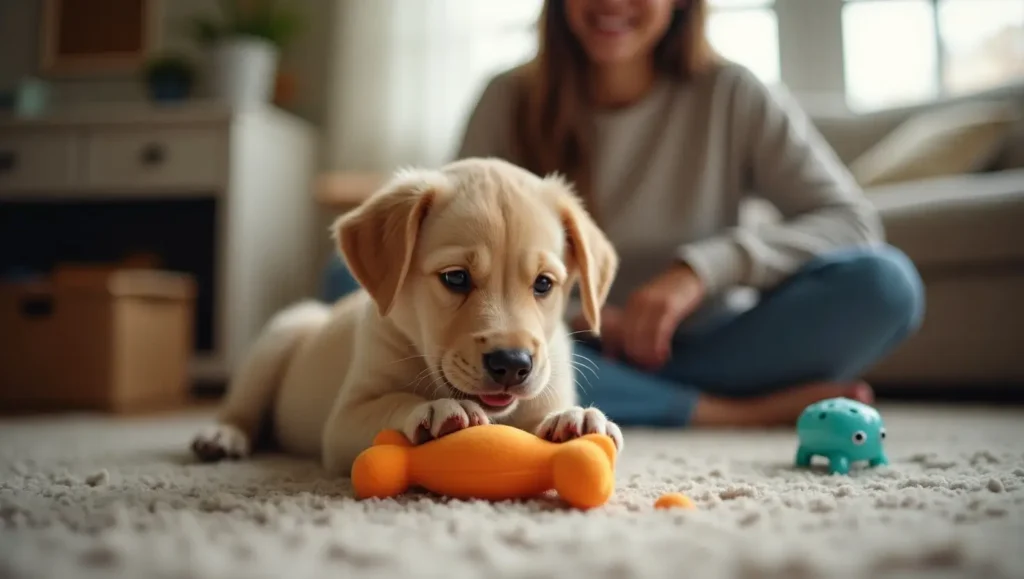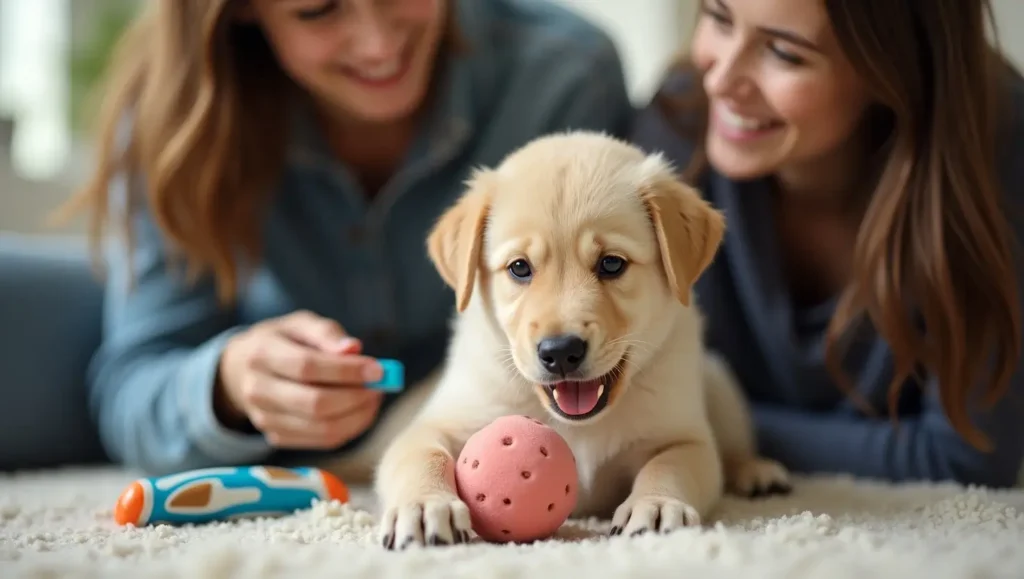Raising a puppy comes with countless questions—and one of the most common is: when do puppies lose their baby teeth? It’s a small milestone with a big impact on your dog’s health, behavior, and comfort. That’s why at WhizPet, we dug deep into veterinary sources, consulted pet care experts, and analyzed real puppy parent experiences to bring you this complete, research-backed guide.
If you’ve ever asked when puppies lose their baby teeth, you’re not alone. The answer can vary based on breed, age, and health—but knowing what to expect can help you avoid stress and support your pup through this sensitive stage. Our team created this resource to make sure dog owners never have to jump between tabs or guess what’s normal.
So, when do puppies lose their baby teeth, and what signs should you watch for? From the first wobbly tooth to a full adult set, this blog will walk you through it all—clearly, accurately, and with real advice that works in the real world.
What Is Puppy Teething and Why It Happens
Puppy teething refers to the natural process where a puppy’s baby (deciduous) teeth fall out and are replaced by permanent adult teeth. This process typically begins around three weeks of age and concludes around six to seven months.
Teething is not just a dental milestone—it also impacts how puppies chew, play, and interact with their environment. It can even influence training and socialization. During this time, puppies experience sore gums, increased chewing behavior, and occasional irritability. Understanding when do puppies lose their baby teeth helps you prepare with the right tools, toys, and training techniques.
The teething phase is especially important because any issues, such as retained baby teeth or misaligned adult teeth, can affect long-term dental health. If you’re unsure when do puppies lose their baby teeth, tracking symptoms and growth stages can help you identify normal progress versus problems that require veterinary attention.

When Do Puppies Lose Their Baby Teeth?
When do puppies lose their baby teeth? This common question has a fairly straightforward answer. Puppies begin losing their baby teeth between 12 to 16 weeks of age. The process usually follows a pattern:
- Incisors: 3-4 months
- Canines: 4-6 months
- Premolars: 4-6 months
- Molars (Adult only): 5-7 months
Most puppies will have a full set of 42 adult teeth by the time they are 6 to 7 months old. If you’re wondering when do puppies lose their baby teeth exactly, the timeline can vary slightly depending on breed and individual growth rate.
Puppy Teething Age Chart: When Do Puppies Lose Their Baby Teeth?
| Puppy Age | Teeth Development Stage |
| 2-4 Weeks | Baby teeth begin to erupt |
| 6-8 Weeks | Full set of baby teeth (28 teeth) |
| 12-16 Weeks | Baby teeth start to fall out |
| 4-6 Months | Adult teeth start replacing baby teeth |
| 6-7 Months | Full set of 42 adult teeth |
Use this chart as a quick reference to understand when do puppies lose their baby teeth and what changes to expect at each stage.
Signs Your Puppy Is Losing Their Baby Teeth
Recognizing the symptoms of teething helps you care for your puppy more effectively. As you start to notice signs like chewing or gum swelling, it often means your puppy is in the phase when puppies lose their baby teeth:
- Mild gum bleeding
- Drooling
- Chewing on furniture, toys, hands
- Whining or irritability
- Decreased appetite
These signs usually indicate that teeth are shifting and gums are inflamed. Offering appropriate chew toys during this time can help relieve discomfort.
Do Puppies Swallow Their Baby Teeth?
Yes, it’s very common for puppies to swallow their baby teeth while chewing or eating. This is harmless and rarely causes any issues. In some cases, you may find a tiny tooth on the floor, in bedding, or stuck in a toy. If you’re tracking when puppies lose their baby teeth, remember that not finding teeth doesn’t mean it hasn’t happened.
Swallowing baby teeth is part of the natural teething process and should not alarm pet parents. Since the teeth are very small and the puppy’s digestive system usually handles them without any problems, it’s often unnoticeable. In fact, many owners don’t even realize when puppies lose their baby teeth until adult ones start to appear. Keeping chew toys clean and inspecting them regularly can help you spot subtle signs of tooth loss.
When Do Puppies Lose Their Baby Teeth and Get Their Adult Teeth?
The transition from baby teeth to adult teeth happens over a few months. Typically, adult teeth begin emerging at 3 to 4 months of age, and the full adult set is usually complete by 6 to 7 months. So, when do puppies lose their baby teeth and gain adult ones? It happens gradually across this period.
Breed-Specific Timelines
- Golden Retrievers: 12 to 16 weeks
- German Shepherds: Around 4 months
- Shih Tzus: Typically 3 to 4 months
Knowing breed-specific patterns can help answer the question of when do puppies lose their baby teeth more precisely.
When Do Puppies Teeth the Worst?
The most intense teething phase occurs between 16 to 20 weeks. This is when the canines and premolars are erupting—these are the larger, sharper teeth that cause the most discomfort. If you’re asking when do puppies lose their baby teeth with the most pain, it’s usually during this phase.
During this phase, provide extra chew options like:
- Frozen carrots
- Puppy teething rings
- Rubber chew toys with texture
Avoid hard items like bones or antlers, as they may damage developing teeth.
Puppy Losing Teeth Symptoms
Here are some common symptoms that indicate your puppy is losing teeth:
- Blood spots on toys or bedding
- Missing teeth
- Bad breath
- Red or swollen gums
- Excessive chewing or biting
While these symptoms are normal and answer the question of when do puppies lose their baby teeth in physical terms, consult your vet if bleeding is excessive or if adult teeth aren’t appearing by 7 months.
You may also notice your puppy pawing at their mouth, showing signs of discomfort during meals, or becoming slightly irritable. These are all part of the teething process and are especially relevant to track when do puppies lose their baby teeth. Gentle oral inspections and keeping a teething diary can help identify any abnormalities. If symptoms worsen or last beyond the typical timeline, it could indicate retained baby teeth or infection—both of which require veterinary care.
Practical Tips for Managing Puppy Teething
To help your puppy through teething:
- Offer safe chew toys: Redirect chewing behavior to approved items.
- Freeze toys: Cold helps numb sore gums.
- Supervise play: Avoid tug-of-war games that may irritate loose teeth.
- Keep items out of reach: Puppies may chew shoes, wires, and furniture.
- Regular vet check-ups: Ensure proper alignment and development.
Knowing when puppies lose their baby teeth allows you to time these strategies effectively for best results.
Real-Life Example
Sarah from Austin, TX, adopted a 10-week-old Labrador. By 14 weeks, her pup began showing excessive chewing behavior. After consulting her vet and using frozen teething toys, she noticed a significant improvement in mood and comfort by week 18. Her experience shows how knowing when puppies lose their baby teeth can help address behavior proactively.

Expert Opinion
According to Dr. Emily Carter, a veterinary dentist based in Seattle:
“Puppy teething is a crucial development phase. Owners should be patient and proactive by providing appropriate dental care and teething relief to ensure healthy adult teeth.”
This professional insight reinforces the importance of understanding when puppies lose their baby teeth and taking steps to support them during this transitional stage. Dr. Carter emphasizes that neglecting dental care during teething can lead to long-term oral issues, including misaligned teeth or gum disease. Knowing when puppies lose their baby teeth allows you to introduce gentle cleaning routines, select vet-approved chew toys, and spot potential problems early.
Veterinarians often recommend that owners monitor the teething timeline closely and schedule a dental check-up if baby teeth don’t fall out as expected. Expert guidance like this ensures that your puppy’s dental development stays on track and prevents unnecessary complications in adulthood.
Common Concerns and FAQs
1. When do golden retriever puppies lose their baby teeth?
Golden retrievers typically begin losing their baby teeth around 12 to 16 weeks and have a full adult set by 6 to 7 months. This aligns with the general timeline for when puppies lose their baby teeth.
2. Do puppies lose teeth at 5 months?
Yes, many puppies are in the midst of teething at 5 months. They are often losing premolars and canines at this age. If you’re asking when puppies lose their baby teeth at this stage, you’re right on schedule.
3. When do puppies start to lose their baby teeth?
Most puppies start losing baby teeth around 12 weeks or 3 months old. So if you’re wondering when puppies lose their baby teeth initially, this is the time.
4. When do german shepherd puppies lose their baby teeth?
German shepherds often begin teething around 14 weeks and usually complete the process by 6 months. Understanding breed patterns can clarify when do puppies lose their baby teeth.
5. When do puppies lose their canine teeth?
Puppies generally lose their baby canine teeth between 4 to 6 months of age. This is part of the main window for when puppies lose their baby teeth.
Conclusion: What Every Pet Parent Should Know
Understanding when puppies lose their baby teeth helps you offer timely care and prevent teething-related issues. Most puppies start teething around 12 weeks and finish by 6 to 7 months, but being proactive during this phase makes a huge difference.
Monitor your puppy’s symptoms, provide appropriate chew toys, and seek veterinary advice when needed. This teething journey is temporary, but the habits you build now shape your dog’s dental health for life. Always remember: when do puppies lose their baby teeth is a question with lasting relevance for long-term care.
Call to Action
Want more tips on raising a healthy puppy and answers to questions like “when do puppies lose their baby teeth”? Subscribe to our newsletter for weekly vet-approved advice, training tips, and product recommendations!
Related blog: For more detailed information about pet care

